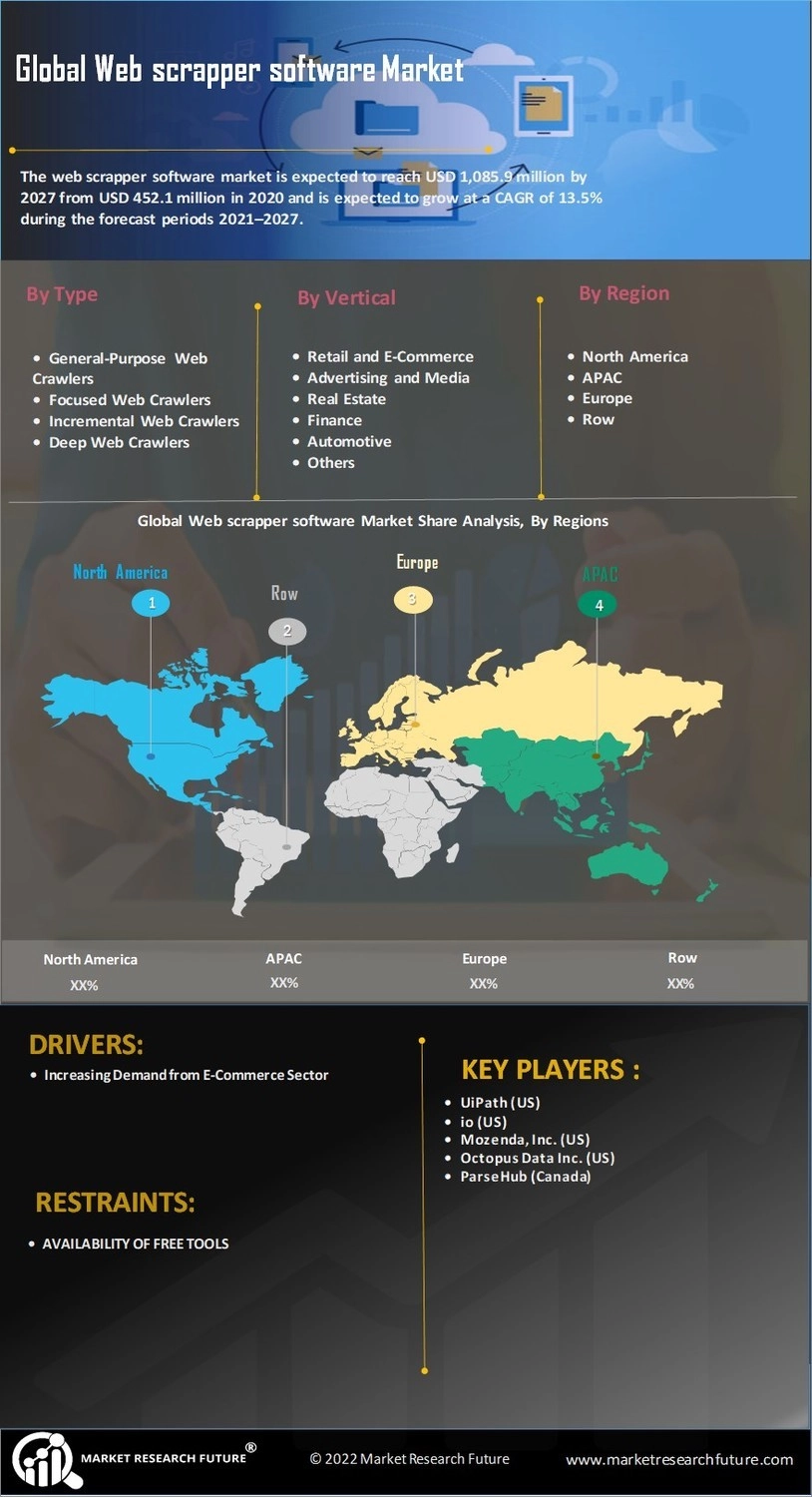Exploring the Role and Benefits of Web Scraper Software in the Digital Age
In today’s data-driven world, web scraper software has become an essential tool for businesses, researchers, and developers who rely on accurate and timely information from the internet. Web scraping refers to the automated process of extracting large volumes of data from websites, which can then be analyzed, stored, or used for various strategic purposes. From monitoring competitors and tracking product prices to conducting market research and gathering leads, web scraper tools are transforming the way organizations access and utilize online data.
Source - https://www.marketresearchfuture.com/reports/web-scrapper-software-market-10796
At its core, web scraper software works by sending automated requests to web pages, retrieving the HTML content, and extracting relevant information using structured rules or algorithms. Advanced scrapers can handle dynamic websites built on JavaScript and even simulate human-like browsing behavior to avoid detection by anti-bot systems. Many modern web scrapers offer user-friendly interfaces that allow non-technical users to extract data easily, while developers can integrate scraping APIs into applications for seamless data collection. This flexibility makes web scraper software highly valuable across industries, especially for e-commerce, digital marketing, finance, and data analytics.
One of the most prominent uses of web scraper software is in price monitoring and competitive intelligence. E-commerce companies regularly scrape data from rival platforms to track price fluctuations, product availability, and customer reviews. This information allows businesses to adjust their pricing strategies dynamically and remain competitive. Similarly, marketing professionals use web scrapers to collect data on trends, customer preferences, and social media sentiments. By analyzing this data, businesses can develop more targeted campaigns and improve customer engagement.
In the financial sector, web scraper software plays a key role in gathering information from multiple sources such as stock exchange websites, financial news portals, and company filings. Analysts and investors use this data to make informed decisions and predict market movements. Academic researchers also rely on web scraping to collect data for studies related to social behavior, digital marketing trends, and public policy. The ability to gather large datasets quickly and accurately makes scraping tools indispensable for modern research.
However, the use of web scraper software also raises ethical and legal considerations. Many websites have terms of service that restrict automated data collection, and scraping without permission can lead to potential violations. To ensure compliance, responsible users implement scraping practices that respect website policies, limit request rates, and anonymize data collection to prevent server overload. Additionally, the rise of AI-powered scraping tools has improved efficiency but also intensified the need for clearer data usage regulations.
Looking ahead, web scraper software is expected to evolve with the growing demand for real-time data intelligence. Integration with artificial intelligence, natural language processing, and cloud-based automation will further enhance scraping capabilities, enabling smarter data extraction and analysis. As organizations continue to embrace digital transformation, web scraper software will remain a cornerstone of data-driven decision-making, empowering users to uncover insights that drive innovation and business growth.
Web scraper software has revolutionized how data is collected and utilized across industries. While challenges related to ethics and legality persist, its benefits in efficiency, accuracy, and accessibility make it an invaluable asset in the digital era.
In today’s data-driven world, web scraper software has become an essential tool for businesses, researchers, and developers who rely on accurate and timely information from the internet. Web scraping refers to the automated process of extracting large volumes of data from websites, which can then be analyzed, stored, or used for various strategic purposes. From monitoring competitors and tracking product prices to conducting market research and gathering leads, web scraper tools are transforming the way organizations access and utilize online data.
Source - https://www.marketresearchfuture.com/reports/web-scrapper-software-market-10796
At its core, web scraper software works by sending automated requests to web pages, retrieving the HTML content, and extracting relevant information using structured rules or algorithms. Advanced scrapers can handle dynamic websites built on JavaScript and even simulate human-like browsing behavior to avoid detection by anti-bot systems. Many modern web scrapers offer user-friendly interfaces that allow non-technical users to extract data easily, while developers can integrate scraping APIs into applications for seamless data collection. This flexibility makes web scraper software highly valuable across industries, especially for e-commerce, digital marketing, finance, and data analytics.
One of the most prominent uses of web scraper software is in price monitoring and competitive intelligence. E-commerce companies regularly scrape data from rival platforms to track price fluctuations, product availability, and customer reviews. This information allows businesses to adjust their pricing strategies dynamically and remain competitive. Similarly, marketing professionals use web scrapers to collect data on trends, customer preferences, and social media sentiments. By analyzing this data, businesses can develop more targeted campaigns and improve customer engagement.
In the financial sector, web scraper software plays a key role in gathering information from multiple sources such as stock exchange websites, financial news portals, and company filings. Analysts and investors use this data to make informed decisions and predict market movements. Academic researchers also rely on web scraping to collect data for studies related to social behavior, digital marketing trends, and public policy. The ability to gather large datasets quickly and accurately makes scraping tools indispensable for modern research.
However, the use of web scraper software also raises ethical and legal considerations. Many websites have terms of service that restrict automated data collection, and scraping without permission can lead to potential violations. To ensure compliance, responsible users implement scraping practices that respect website policies, limit request rates, and anonymize data collection to prevent server overload. Additionally, the rise of AI-powered scraping tools has improved efficiency but also intensified the need for clearer data usage regulations.
Looking ahead, web scraper software is expected to evolve with the growing demand for real-time data intelligence. Integration with artificial intelligence, natural language processing, and cloud-based automation will further enhance scraping capabilities, enabling smarter data extraction and analysis. As organizations continue to embrace digital transformation, web scraper software will remain a cornerstone of data-driven decision-making, empowering users to uncover insights that drive innovation and business growth.
Web scraper software has revolutionized how data is collected and utilized across industries. While challenges related to ethics and legality persist, its benefits in efficiency, accuracy, and accessibility make it an invaluable asset in the digital era.
Exploring the Role and Benefits of Web Scraper Software in the Digital Age
In today’s data-driven world, web scraper software has become an essential tool for businesses, researchers, and developers who rely on accurate and timely information from the internet. Web scraping refers to the automated process of extracting large volumes of data from websites, which can then be analyzed, stored, or used for various strategic purposes. From monitoring competitors and tracking product prices to conducting market research and gathering leads, web scraper tools are transforming the way organizations access and utilize online data.
Source - https://www.marketresearchfuture.com/reports/web-scrapper-software-market-10796
At its core, web scraper software works by sending automated requests to web pages, retrieving the HTML content, and extracting relevant information using structured rules or algorithms. Advanced scrapers can handle dynamic websites built on JavaScript and even simulate human-like browsing behavior to avoid detection by anti-bot systems. Many modern web scrapers offer user-friendly interfaces that allow non-technical users to extract data easily, while developers can integrate scraping APIs into applications for seamless data collection. This flexibility makes web scraper software highly valuable across industries, especially for e-commerce, digital marketing, finance, and data analytics.
One of the most prominent uses of web scraper software is in price monitoring and competitive intelligence. E-commerce companies regularly scrape data from rival platforms to track price fluctuations, product availability, and customer reviews. This information allows businesses to adjust their pricing strategies dynamically and remain competitive. Similarly, marketing professionals use web scrapers to collect data on trends, customer preferences, and social media sentiments. By analyzing this data, businesses can develop more targeted campaigns and improve customer engagement.
In the financial sector, web scraper software plays a key role in gathering information from multiple sources such as stock exchange websites, financial news portals, and company filings. Analysts and investors use this data to make informed decisions and predict market movements. Academic researchers also rely on web scraping to collect data for studies related to social behavior, digital marketing trends, and public policy. The ability to gather large datasets quickly and accurately makes scraping tools indispensable for modern research.
However, the use of web scraper software also raises ethical and legal considerations. Many websites have terms of service that restrict automated data collection, and scraping without permission can lead to potential violations. To ensure compliance, responsible users implement scraping practices that respect website policies, limit request rates, and anonymize data collection to prevent server overload. Additionally, the rise of AI-powered scraping tools has improved efficiency but also intensified the need for clearer data usage regulations.
Looking ahead, web scraper software is expected to evolve with the growing demand for real-time data intelligence. Integration with artificial intelligence, natural language processing, and cloud-based automation will further enhance scraping capabilities, enabling smarter data extraction and analysis. As organizations continue to embrace digital transformation, web scraper software will remain a cornerstone of data-driven decision-making, empowering users to uncover insights that drive innovation and business growth.
Web scraper software has revolutionized how data is collected and utilized across industries. While challenges related to ethics and legality persist, its benefits in efficiency, accuracy, and accessibility make it an invaluable asset in the digital era.
0 Commenti
0 condivisioni
359 Views
0 Anteprima



